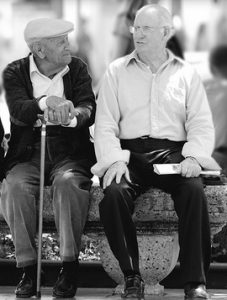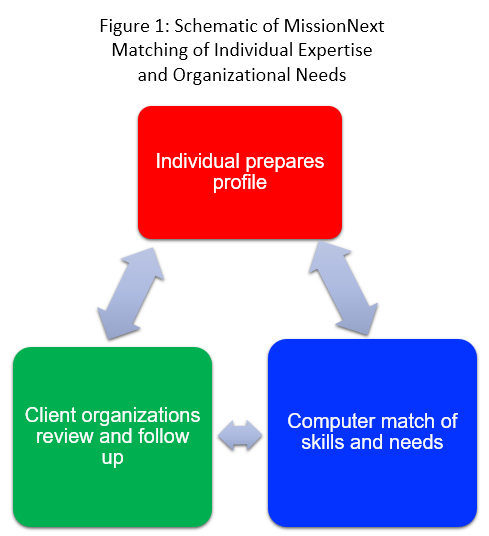One trend that has been in progress for quite some time now is the aging of the population. We all know that people are living longer and spending a greater portion of their life as retirees. As long as they have saved enough to provide them with a comfortable retirement that is a good thing.

But many retirees want more out of retirement than just sitting on a bench or even golfing every day. They want the remainder of their life to have a purpose and they still want to contribute to society in some meaningful way. As Jack Hansen says in the following article you could contribute to “Meals on Wheels” by delivering meals, but if you are a former professional you might have skills that could be much more valuable to the organization than just being a delivery person. ~Tim McMahon, editor
Skill-Based Volunteering
By Jack Hansen
Several months ago, I gave a TEDx talk in Greenville, SC on the public policy implications of retirement. In this talk, I focused on the desire of many retirees to retire to something about which they care deeply, not just retire from their former professional life. This perspective was expressed by many of the men and women we interviewed as the basis for our books on the personal dimensions of retirement (Shaping a Life of Significance for Retirement, 2010; Retirement as Spiritual Pilgrimage: Stories Scripture, and Practices for the Journey, 2016.) The implication is that many retirees are open to and interested in contributing their time, energies, and expertise to the community or faith-based organizations, to work for the good of others.
As a practical matter, most volunteer opportunities in our communities and churches require our presence, but not any specialized expertise or experience we may possess. These “routine” volunteer tasks are very important and should be encouraged. Nevertheless, many retirees could offer much more in the right circumstances.
For example, one man I interviewed retired as a bank president. One commitment he has undertaken in retirement was delivering meals as a volunteer for Meals on Wheels. He deeply felt the value of this task, but he also observed “I think I could do much more for the organization than meal delivery if there were the opportunity.” His statement, along with similar ones in other interviews raises two important questions:
- How might we connect individual retiree interests and skills with the corresponding needs of the community or faith-based organizations?
- If we were to do this successfully, what might be the impact?
We have surveyed the volunteer landscape of our country and found remarkably few examples of successful matching of volunteer expertise with the expertise needs of an organization. An effective example is Finishers Project, which has developed a sophisticated computer matching algorithm to pair mission opportunities worldwide with the expertise and interests of baby boomers interested in short-term service.
 The schematic above shows how this works. An individual goes to the Finishers web page, establishes a secure account, and fills out a profile of interests and expertise. Member mission organizations each develop a detailed description of short-term needs for expertise, which are also submitted to the Finishers website. The matching algorithm then identifies potentially good matches between individuals and needs, and forwards contact information for the individual to the mission organization. This organization contacts the individual identified within two weeks to begin a more in-depth conversation about the opportunity.
The schematic above shows how this works. An individual goes to the Finishers web page, establishes a secure account, and fills out a profile of interests and expertise. Member mission organizations each develop a detailed description of short-term needs for expertise, which are also submitted to the Finishers website. The matching algorithm then identifies potentially good matches between individuals and needs, and forwards contact information for the individual to the mission organization. This organization contacts the individual identified within two weeks to begin a more in-depth conversation about the opportunity.
We observed a different and potentially complementary, approach in one large church in the San Francisco Bay area. This particular church has a significant population of professional men and women near retirement. One staff member meets with each individual approaching retirement to discuss the person’s interests and plans. In some circumstances, they see a match between ministry opportunities or the needs of the congregation and the expertise and experience of the individual. For example, one of their members approaching retirement had managed plants in several countries for a multinational corporation, requiring he and his wife to live in a range of cultures. Through a series of conversations, it was determined that this individual and his wife were uniquely suited to lead the church’s international medical mission outreach efforts. Fulfilling this responsibility has been important to both the couple and the church.
Let us turn now to the potential impact of facilitating skill-based volunteering in our communities and churches. According to the 2010 U.S. Census, and projections for 2015, about 21% of the U.S population age 65 and above hold at least a bachelor’s degree. (Of course, there are many other ways that people gain specialized expertise, such as through military training programs, apprentice programs, etc.; but we have no quantitative measures of the number of retirees in this category.) In the county I reside in (Greenville County in South Carolina), to take one example, approximately 15,700 individuals age 65 and over have at least bachelor’s degrees. Only a fraction of this group would be in a position to volunteer their expertise. But suppose just 5% (or 785 individuals) could be thus engaged for their expertise in accounting, human resources, education, etc. The impact on the community and faith-based organizations would be enormous, according to leaders of organizations of both types. The challenge for our community and yours is how to access this rich reservoir of expertise, which one writer has referred to as “our only growing natural resource.”
You might also like:
